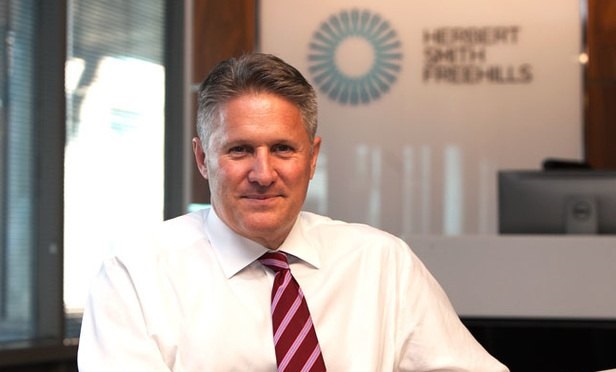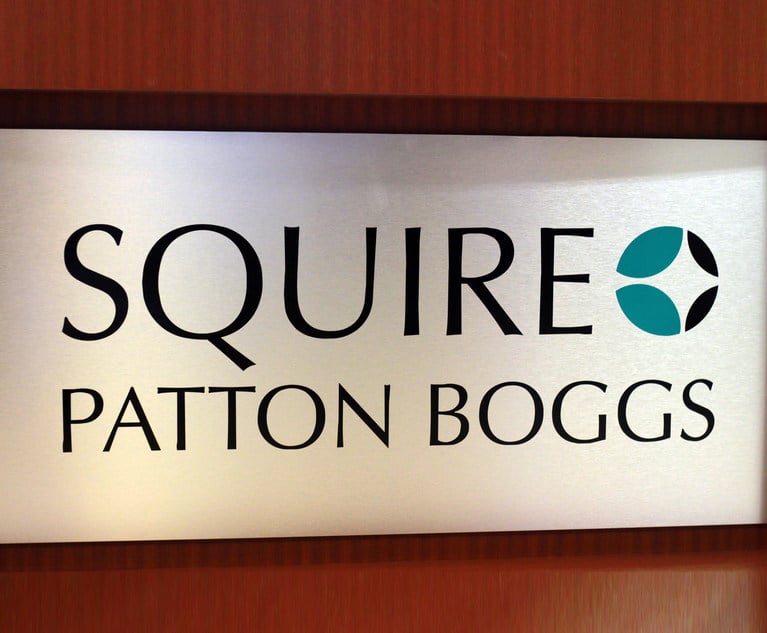Herbert Smith Freehills PEP Jumps 11% as Revenues Pick Up
The firm's PEP is edging closer to £1m.
July 04, 2019 at 07:24 AM
3 minute read
 Herbert Smith Freehills CEO Mark Rigotti
Herbert Smith Freehills CEO Mark Rigotti
Herbert Smith Freehills' (HSF) profit per equity partner (PEP) has increased by 11%, marking the second year of double-digit growth in the figure at the firm.
PEP now stands at £949,000 ($1.2 million) at the Anglo-Australian outfit, which has also boosted its global revenue by 4% to hit £965.7 million ($1.2 billion). It has been a better year for the firm, which last year posted revenue growth of less than 1%.
HSF CEO Mark Rigotti also said the point value of the firm's lockstep pay system increased by 15% during the last year. Meanwhile, the firm's total profit grew by 11% to reach £306.7 million ($384 million).
Rigotti told Law.com's Legal Week that "there's a momentum and confidence in the firm that feels refreshed and powerful."
The firm's corporate practice grew its revenue by 15%, while its finance practice bolstered its turnover by 9%, according to Rigotti.
He added that the firm now aims to broaden its current offering across Europe and China, investing in further bandwidth across its offices. There are no current plans to open new bases in those areas.
The firm's New York office also performed well, according to Rigotti.
"Our New York office is doing well – it's a strong business now with the right support around it," he said. "We'll keep sensibly growing that."
HSF financial director Steve Bowers added that renewed efforts in service delivery and investment had also benefited the firm's bottom line.
"A lot of it boils down to client delivery and prioritising where we are spending money. We've made decisions regarding lateral partner hires that have really paid off. In the U.S., we've invested in further space and are introducing our legal service delivery function to help support that office," he said. "We're also investing in our IT and data security systems to increase our resilience, to make sure we have the right level of assurance to give ourselves and our clients."
Rigotti also highlighted the firm's push to ensure a positive working culture, which last year saw it overhaul its associate pay structure to better reward individual performance and not just seniority level.
Earlier this year, the firm also reset its partner gender target. It is now targeting a partnership comprising 35 percent women in both partner and partner leadership roles by May 1, 2023.
This content has been archived. It is available through our partners, LexisNexis® and Bloomberg Law.
To view this content, please continue to their sites.
Not a Lexis Subscriber?
Subscribe Now
Not a Bloomberg Law Subscriber?
Subscribe Now
NOT FOR REPRINT
© 2025 ALM Global, LLC, All Rights Reserved. Request academic re-use from www.copyright.com. All other uses, submit a request to [email protected]. For more information visit Asset & Logo Licensing.
You Might Like
View All
Squire Patton Boggs Hires 7-Lawyer Team to Beef Up ESG Practice in Brussels
2 minute read

Kirkland’s O’Shea Acts Alongside Former Outfit Simpson Thacher on KKR Deal
2 minute read
King & Spalding and Ex-Partner Accused of Fraud After Client Claims £1.7 Million Deposit Loss
2 minute readTrending Stories
- 1Day Pitney Announces Partner Elevations
- 2The New Rules of AI: Part 2—Designing and Implementing Governance Programs
- 3Plaintiffs Attorneys Awarded $113K on $1 Judgment in Noise Ordinance Dispute
- 4As Litigation Finance Industry Matures, Links With Insurance Tighten
- 5The Gold Standard: Remembering Judge Jeffrey Alker Meyer
Who Got The Work
J. Brugh Lower of Gibbons has entered an appearance for industrial equipment supplier Devco Corporation in a pending trademark infringement lawsuit. The suit, accusing the defendant of selling knock-off Graco products, was filed Dec. 18 in New Jersey District Court by Rivkin Radler on behalf of Graco Inc. and Graco Minnesota. The case, assigned to U.S. District Judge Zahid N. Quraishi, is 3:24-cv-11294, Graco Inc. et al v. Devco Corporation.
Who Got The Work
Rebecca Maller-Stein and Kent A. Yalowitz of Arnold & Porter Kaye Scholer have entered their appearances for Hanaco Venture Capital and its executives, Lior Prosor and David Frankel, in a pending securities lawsuit. The action, filed on Dec. 24 in New York Southern District Court by Zell, Aron & Co. on behalf of Goldeneye Advisors, accuses the defendants of negligently and fraudulently managing the plaintiff's $1 million investment. The case, assigned to U.S. District Judge Vernon S. Broderick, is 1:24-cv-09918, Goldeneye Advisors, LLC v. Hanaco Venture Capital, Ltd. et al.
Who Got The Work
Attorneys from A&O Shearman has stepped in as defense counsel for Toronto-Dominion Bank and other defendants in a pending securities class action. The suit, filed Dec. 11 in New York Southern District Court by Bleichmar Fonti & Auld, accuses the defendants of concealing the bank's 'pervasive' deficiencies in regards to its compliance with the Bank Secrecy Act and the quality of its anti-money laundering controls. The case, assigned to U.S. District Judge Arun Subramanian, is 1:24-cv-09445, Gonzalez v. The Toronto-Dominion Bank et al.
Who Got The Work
Crown Castle International, a Pennsylvania company providing shared communications infrastructure, has turned to Luke D. Wolf of Gordon Rees Scully Mansukhani to fend off a pending breach-of-contract lawsuit. The court action, filed Nov. 25 in Michigan Eastern District Court by Hooper Hathaway PC on behalf of The Town Residences LLC, accuses Crown Castle of failing to transfer approximately $30,000 in utility payments from T-Mobile in breach of a roof-top lease and assignment agreement. The case, assigned to U.S. District Judge Susan K. Declercq, is 2:24-cv-13131, The Town Residences LLC v. T-Mobile US, Inc. et al.
Who Got The Work
Wilfred P. Coronato and Daniel M. Schwartz of McCarter & English have stepped in as defense counsel to Electrolux Home Products Inc. in a pending product liability lawsuit. The court action, filed Nov. 26 in New York Eastern District Court by Poulos Lopiccolo PC and Nagel Rice LLP on behalf of David Stern, alleges that the defendant's refrigerators’ drawers and shelving repeatedly break and fall apart within months after purchase. The case, assigned to U.S. District Judge Joan M. Azrack, is 2:24-cv-08204, Stern v. Electrolux Home Products, Inc.
Featured Firms
Law Offices of Gary Martin Hays & Associates, P.C.
(470) 294-1674
Law Offices of Mark E. Salomone
(857) 444-6468
Smith & Hassler
(713) 739-1250








